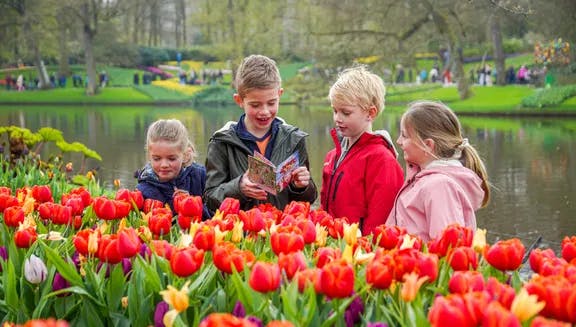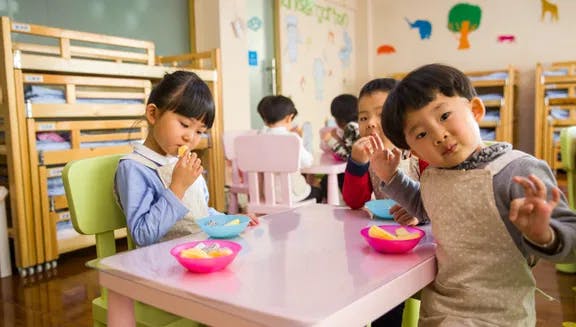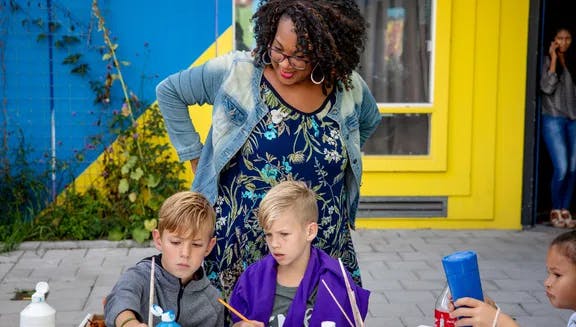
Primary school
Find out what to expect from education in the Netherlands in our video on the Dutch school system.

The primary school curriculum
Children in the Netherlands generally attend primary school (basisschool) from age four to age 12, before they move on to secondary school (or high school). Most primary schools combine groups 1 and 2 in a class called kleuters (pre-schoolers) and the focus is on learning through play, social skills, structure, and gradual preparation for reading and writing. Formal reading and writing starts in group 3 (age 6). Find out more about what’s covered in the national primary school curriculum.
Teaching philosophies and special needs education
Several schools throughout the Amsterdam Area provide education based on a particular pedagogical vision or religious conviction. Examples of the former are the Montessori or Steiner educational systems; there are also schools based on Catholic, Jewish, Protestant and Islamic principles. The Netherlands also offers a high standard of special needs education for students that require extra support. More information is available on the government.nl website.
School hours
Classes are held from Monday to Friday. Primary schools are required by law to provide 940 hours of tuition per year, however individual school hours can vary. Most lessons take place between 08:30 and 15:00, with a break for lunch from 12:00 to 13:00. Most schools are also closed on Wednesday afternoons.
National test to determine secondary education
In the final year of primary school (group 8, age 12), all students take a national aptitude test known as the Centrale Eindtoets Basisonderwijs (central end test). This is to measure what the students have learned over the previous eight years. All primary schools are obliged to participate in the test, which is held in April each year. Before it takes place, the group 8 teacher assesses what level of high school education would best fit each student. They base their recommendation on the student’s test scores for their whole school career, as well as their intelligence, attitude towards learning, interests, etc. Based on the outcome of the test and the opinion of the teacher, the students receive advice about the appropriate level of high school education to follow. The assessment of the teacher is the decisive factor.
Cost of schooling
Parents do not pay school fees for state-funded primary education in the Netherlands, but schools may ask parents for a voluntary contribution towards the costs of extracurricular activities (usually up to €100 per year). Parents do pay for after-school care and lunchtime supervision, as they are run by external organisations.
Moving to the Amsterdam Area with children that don’t speak Dutch
All schools are required to start teaching English no later than in group 7 (10-11 years). Increasingly, schools are beginning early foreign language education, often from 4 years old (mostly in English). Some schools now offer early English, starting from the age of 4 for about 1,5 hours per week. A newer development is bilingual schools that split the curriculum between Dutch and (usually) English. For example, 30-50% of their curriculum may be taught in English. Bilingual secondary education is more commonly known in Dutch as tweetalig onderwijs or TTO. There are several bilingual schools in the Amsterdam Area:
- Visserschool
- Winford Bilingual Primary School
- School of Understanding (Amsterdam and Amstelveen)
- International School Hilversum
- Gooise Daltonschool (Hilversum)
- Junior Campus (Hilversum)
- Violenschool (Hilversum)
- De Wilge (both Alberdingk Thijm schools in Hilversum).
Other bilingual schools in the Netherlands beyond the Amsterdam Area include Harbour Bilingual and Passe-Partout (Rotterdam), Casaschool (Pijnacker), Driespan (Enkhuizen), Eglantier Voorhof (Delft), Groningse Schoovereniging (Groningen), Haagsche Schoolvereniging (Den Haag), International School Eindhoven (Eindhoven), Lanteerne (Nijmegen), Merlin (Eemnes), Prinseschool (Enschede), Talent (Lent).
Please note: most primary and secondary bilingual schools want their students to speak Dutch before they enter their school.
Although there are many options for international and bilingual schools, international families are increasingly choosing Dutch schools for their children. The standard of education is regarded as very high (according to the OECD), there’s a greater selection of these schools to choose from, and they allow children to integrate into Dutch society more easily. In addition, Dutch schools receive state-funding, making them more affordable.
Children aged between four and 12 years old, new to the Netherlands and don’t speak Dutch join so-called newcomers' classes. These classes focus on learning Dutch and acquaint the children with Dutch culture, with the aim of them continuing in regular Dutch or bilingual education after one year.
Compulsory attendance
Please note that school attendance is compulsory for children aged 5-16. If a child is often absent from school, the school will notify the municipality. As a parent, you are responsible for compliance with the rules of compulsory education. There are a few exceptions to this law: work commitments (proof from your employer is required), family events, religious celebrations and, naturally, illness. Please take this law very seriously, as you can be fined if you do not request official permission to keep your child away from school. Check the dates of upcoming school holidays.
Choosing a primary school
It is advisable to look for a school soon after arriving in the Netherlands. It’s always a good idea to read up on their curriculum, the education ethos of the school, and to try to arrange a visit. Most organise open days (voorlichtingsdagen) – details can typically be found on the schools’ websites – or accept private appointments. Find a detailed guide to choosing a school and how to apply. You can check for primary schools (basisschool) in your area by visiting the website ‘Scholen op de Kaart’. Although it is in Dutch, simply enter your postcode on the homepage to immediately see a list of schools. These are ordered by their distance from your home, along with other details, such as religious background or particular educational approaches.
Open days
An open day can be slightly overwhelming considering the importance of the choice at hand. However, it can be a big help in the process of finding and applying for a primary school place for your child. Beyond your overall impression, considering if the school meets your family’s needs and that all-important parental gut feeling, here are some pointers on questions to ask – both yourself and the school – when you visit an open day at an Amsterdam primary school.
- What is my impression of the head and the teachers?
- What is the interaction among children like?
- How are the academic and social settings? Do they meet the needs of my child?
- Which extracurricular activities and support are offered?
- Does the school have experience with non-Dutch speakers?
- Does the school offer extra classes for non-Dutch speakers?
It is also a good idea to visit the school again on a regular day – go when the school is out and you will be able to get a grasp of the atmosphere. Then you can also speak to other parents about their experiences with the school.
Download IN Amsterdam’s guide to education in the Amsterdam Area (pdf) for more information on enrolling your children. And if you live in Amsterdam, visit the City of Amsterdam's English-language site for specific primary schools information and enrolment forms.









